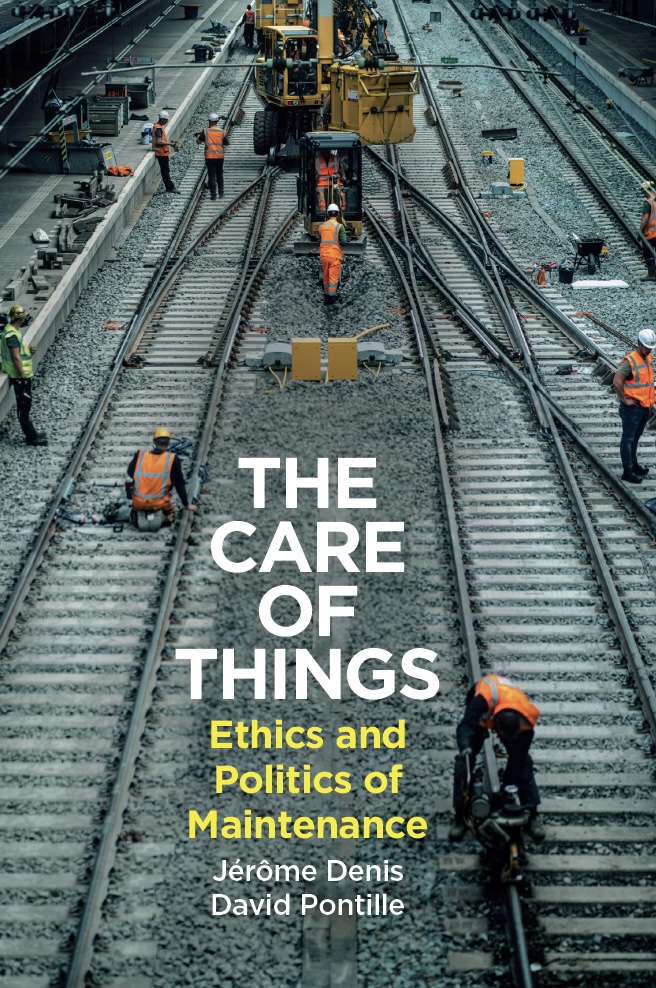The CSI is pleased to announce the publication of the book
The Care of Things
Ethics and Politics of Maintenance
By Jérôme Denis and David Pontille
Translated by Andrew Brown

What does a coffee machine, a car, road signs, a smartphone, a cathedral, a work of art, a satellite, a bicycle, a washing machine, a bridge, a watch, a computer, the body of a prominent politician and a tractor have in common? Pretty much nothing – except for the fact that, no matter how small, large, important or insignificant something is, it rarely survives without being cared for. Every object eventually experiences wear and tear, it deteriorates, stops working or breaks down. But are we giving the care of things the recognition it deserves? A counterpoint to our modern obsession with innovation but less striking than the one-off act of restoration, the delicate act of making things last rarely attracts our attention.
This book disrupts our dominant narratives by putting those individuals skilled in the art of maintenance front and centre. Jérôme Denis and David Pontille shine a spotlight on the subtle aspects of caring for things, tracing the stories of those involved and, with them, the ethical challenges raised and political lessons learned. These people demonstrate a sensitivity and attentiveness to fragility; they encourage us to cultivate a material diplomacy in which wear is accepted and our relation to things becomes a matter of negotiation and compromise – a far cry from the frenetic rhythm of planned obsolescence inherent in hyper-consumerism. Maintenance demarcates the contours of a world in which we have relinquished the human longing for unlimited power and technological autonomy, a world where our attachment to things is more profound than we ever imagined.
ISBN: 978-1509562381
Publisher: Polity
February 2025
The Care of Things. Ethics and Politics of Maintenance was published in its French original version Le soin des choses. Politiques de la maintenance in October 2022 by Éditions La Découverte in Paris.
Table of Contents
Acknowledgements
Introduction
The art of making things last
A transfer of attention
The vocabulary of humans and things
Pathways
Chapter 1: Maintaining
Beyond innovation
Repair and breakdown
A daily pulsation
Neither heroes nor heroines
Reassigning attention
Chapter 2: Fragilities
Societies repopulated with objects
The diplomacy of wear and tear
Care and things
Chapter 3: Attention
Displacements
Multisensoriality
Expertise
Vigilance
Attachments
Chapter 4: Encounters
Recalcitrance
Disassembly
Transformations
Worries
The dance of maintenance
Chapter 5: Time
Prolongation
Permanence
Slowing down
Stubbornness
From time to thing
Chapter 6: Tact
Adjustments
Surprises
Heritage diplomacies
Pathways inspired by environmental ethics
Ethics and the care of things
Chapter 7: Conflicts
Shortening the life of goods
The values of duration
The emancipation of use
Redistributed knowledge
The people of things
Responsibilities
Conclusion
Notes
Index
Endorsements
“For years, the dynamic duo of Denis and Pontille have been producing some of the best work on maintenance and repair out there (full stop). This new translation is a landmark contribution, and one we’ll be reading and learning from for years to come.”
Steven J. Jackson, Professor of Information Science and Science and Technology Studies, Cornell University
« This is a spirited book, that, with its large array of cases, will gradually get you sensitised to the fragility of a great diversity of things – so that you come to hear which care they call for – and admire the hands-on experts, who nurture stuff and tools, rather than tolerating their decay. »
Annemarie Mol, Professor dr. A., Faculty of Social and Behavioural Sciences, University of Amsterdam
« This book makes of the thinking around maintenance into a timely intervention, creating a distinctive proposition that can appeal to a broad readership. The writing is beautiful and accessible, without losing in theoretical sophistication. The thinking is philosophical and ethnographically rich at the same time, and the book combines and deploys a remarkable depth of scholarship, careful attention to empirical detail and stories, as well as a generous approach to theorising-with the wide range of authors they are in conversation with. »
Maria Puig de la Bellacasa, Professor, History of Consciousness Department, UC Santa Cruz

